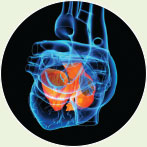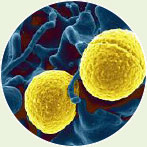
Error: No layouts found
Einstein scientists received more than $160 million in research funding from the National Institutes of Health (NIH) during the federal fiscal year 2016. Here are highlights of grants received between July 1, 2016, and December 31, 2016.

The NIH has awarded Einstein and Pennsylvania State University researchers a five-year, $12.2 million grant to continue studies on the aging brain, Alzheimer’s disease and other dementias. Scientists at the Einstein Aging Study will conduct the research in collaboration with experts at Pennsylvania State University. Their studies will enroll seniors who will be equipped with smartphones on which they’ll answer questions testing their thinking ability—an effort to measure the cognitive changes that precede the onset of dementia.
“We will also look at those risk factors for cognitive decline that can be corrected, including stress, pain, vascular disease and poor sleep,” says Richard B. Lipton, M.D., co-principal investigator on the grant and the Edwin S. Lowe Chair in Neurology at Einstein, and vice chair of neurology at Einstein and Montefiore.

Einstein and Montefiore, in collaboration with the City University of New York, have received a $9.4 million grant from the NIH to lead research in Central Africa to improve clinical care and health outcomes for patients with HIV. The ongoing, five-country observational study, called Central Africa International Epidemiologic Databases to Evaluate AIDS, involves more than 50,000 HIV-positive children and adults taking antiretroviral therapy.
“Over the next five years, we will use our high-quality data to address scientific clinical and healthcare delivery questions that will inform care in Central Africa and beyond,” says principal investigator Kathryn Anastos, M.D., a professor of medicine, of epidemiology & population health and of obstetrics & gynecology and women’s health at Einstein and an attending physician in general internal medicine at Montefiore.

The NIH has awarded Bernice E. Morrow, Ph.D., and collaborators at the Children’s Hospital of Philadelphia a five-year, $7.5 million grant to study the genetics of congenital heart abnormalities.
Congenital heart disease affects four of every thousand live births, with most cases due to unknown causes. Dr. Morrow studies the genetics of a rare syndrome usually referred to as 22q11.2 deletion syndrome (22q11.2DS), in which affected individuals are missing a portion of chromosome 22.
Approximately 60 percent of patients with 22q11.2DS, also known as DiGeorge syndrome and velocardiofacial syndrome, have congenital heart disease, mostly of the conotruncal type (i.e., malformations of the cardiac outflow tract), which includes aortic arch anomalies. Dr. Morrow is professor and director of the division of translational genetics in the department of genetics and the Sidney L. and Miriam K. Olson Chair in Cardiology.

The NIH has awarded Einstein a five-year, $6 million grant that creates a new research program at the Rose F. Kennedy Intellectual and Developmental Disabilities Research Center (IDDRC). The program focuses on 22q11.2 deletion syndrome (22q11.2DS), described at left.
“The grant will provide critical support for dozens of ongoing studies in intellectual and developmental disabilities at Einstein,” says co-principal investigator Steven U. Walkley, D.V.M., Ph.D., director of the IDDRC and a professor in the Dominick P. Purpura Department of Neuroscience and the departments of pathology and of neurology. The grant’s other co-principal investigator is Sophie Molholm, Ph.D., an associate professor of pediatrics and of neuroscience and the Muriel and Harold Block Faculty Scholar in Mental Illness and co-director of IDDRC.

Marina Reznik, M.D., M.S., an attending pediatrician in the department of pediatrics at Children’s Hospital at Montefiore and associate professor of pediatrics at Einstein, has been awarded a $4.2 million grant from the NIH to launch a five-year study to help healthcare providers adhere to national asthma-management guidelines and improve clinical outcomes for children with asthma.
“Asthma disproportionately affects low-income, minority children living in inner cities such as the Bronx,” says Dr. Reznik.
Using her NIH grant, Dr. Reznik is leading a clinical trial at 20 Montefiore Medical Group outpatient sites to find out why national asthma-management guidelines aren’t being used. The goal is to improve clinical outcomes for children ages two to 12 with persistent or uncontrolled asthma.

Einstein researchers have received a five-year, $3.9 million NIH grant to investigate the role of the gut microbiome in the development of type 2 diabetes among Hispanics/Latinos, the fastest-growing segment of the U.S. population.
Einstein investigators on the grant are Robert C. Kaplan, Ph.D., professor in the department of epidemiology & population health; and Robert D. Burk, M.D., professor in the departments of pediatrics, microbiology & immunology, obstetrics & gynecology and women’s health and epidemiology & population health.
The human gut microbiome is composed of billions of bacteria and other microbes found in the intestines. It is a promising target for dietary changes and treatments to combat type 2 diabetes—especially in groups, such as the Hispanic/Latino population, that disproportionately develop the disease.

Tuberculosis (TB) is the leading cause of death worldwide among people infected with HIV. But no current test can reliably show when latent (inactive) TB infections in people with HIV start progressing to active—and potentially fatal—TB disease. An Einstein researcher has received a five-year, $3.7 million NIH grant to identify biomarkers that signal an increase in activity by Mycobacterium tuberculosis (Mtb), the bacterium that causes TB, in people with HIV.
“While infection with HIV or TB is usually manageable, the combination of the two diseases is particularly deadly,” says the study’s principal investigator, Jacqueline M. Achkar, M.D., M.S., an associate professor of medicine and of microbiology & immunology at Einstein and an attending physician in medicine at Montefiore.

Einstein and Montefiore researchers have received a five-year $3.7 million grant from the NIH to test a new intervention to improve the health outcomes of children of South Asian immigrants. They are the fastest-growing immigrant community in the United States.
Community health workers, who will also be South Asian women, will visit nearly 400 mothers with newborns in the Bronx and greater New York to help them learn healthy feeding practices and improve oral hygiene for their children.
“We’ve found that many new mothers bottle-feed more frequently and delay weaning to a later age than is optimal,” says Alison Karasz, Ph.D., an associate professor of family and social medicine at Einstein and principal investigator on the project. The project’s co-principal investigator is Karen A. Bonuck, Ph.D., a professor of family and social medicine, of obstetrics & gynecology and women’s health and of pediatrics at Einstein.

The NIH has awarded researchers at Einstein and Montefiore a five-year, $2.9 million grant to launch a new center, one of only eight in the country, for diabetes translational research. The center—will serve as a collaborative hub for investigators conducting studies on prediabetes, diabetes and its complications.
The two principal investigators on the grant are Elizabeth A. Walker, Ph.D., R.N., a professor of medicine and of epidemiology & population health at Einstein, and Judith Wylie-Rosett, Ed.D., R.D., a professor and division head of health promotion and nutrition research in the department of epidemiology & population health, the Atran Foundation Chair in Social Medicine and a professor of medicine at Einstein.
The center’s overall goal is to improve the health of people who have diabetes or are at risk for developing it.

Two Einstein co-investigators were awarded a five-year, $2.6 million NIH grant to make immunotherapy agents that more effectively treat a variety of cancers while causing far fewer side effects than current immunotherapies.
The two investigators are Steven C. Almo, Ph.D., a professor and chair of biochemistry, a professor of physiology & biophysics and the Wollowick Family Foundation Chair at Einstein; and Chandan Guha, M.B.B.S., Ph.D., a professor of radiation oncology, of pathology and of urology at Einstein and vice chair of radiation oncology at Einstein and the Montefiore Einstein Center for Cancer Care.
The Einstein researchers have developed a novel immunotherapy strategy for directing T cells to attack specific types of cancer while also modulating their behavior. This strategy allows them to rev up T-cell activity to attack cancer cells or suppress their activity in situations where immunotherapy is aimed at treating autoimmune diseases. in situations where immunotherapy is aimed at treating autoimmune diseases.